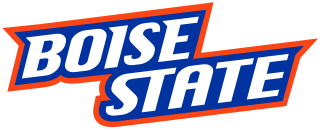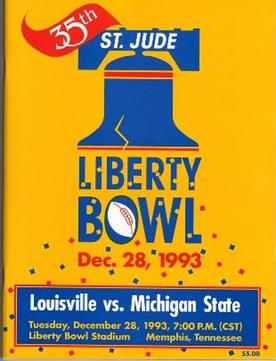
The Big East Conference was a collegiate athletics conference that consisted of as many as 16 universities in the eastern half of the United States from 1979 to 2013. The conference's members participated in 24 NCAA sports. The conference had a history of success at the national level in basketball throughout its history, while its shorter football program, created by inviting one college and four other "associate members" into the conference, resulted in two national championships.

The Fiesta Bowl is an American college football bowl game played annually in the Phoenix metropolitan area. From its beginning in 1971 until 2006, the game was hosted at the Sun Devil Stadium in Tempe, Arizona. Since 2007, the game has been played at the State Farm Stadium in Glendale, Arizona. Since 2022, it has been sponsored by Vrbo and officially known as the Vrbo Fiesta Bowl. Previous sponsors include PlayStation, BattleFrog, Vizio, Tostitos, IBM (1993–1995) and Sunkist (1986–1990).

The Liberty Bowl is an annual American college football bowl game played in late December or early January since 1959. For its first five years, it was played at Philadelphia Municipal Stadium in Philadelphia before being held at Atlantic City Convention Hall in 1964. Since 1965, the game has been held at Simmons Bank Liberty Stadium in Memphis, Tennessee. Because of the scheduling of the bowl game near the end of the calendar year, no game was played during calendar years 2008 or 2015, while two games were played in calendar years 2010 and 2016.

The Bowl Championship Series (BCS) was a selection system that created four or five bowl game match-ups involving eight or ten of the top ranked teams in the NCAA Division I Football Bowl Subdivision (FBS) of American college football, including an opportunity for the top two teams to compete in the BCS National Championship Game. The system was in place for the 1998 through 2013 seasons and in 2014 was replaced by the College Football Playoff.

The BCS National Championship Game, or BCS National Championship, was a postseason college football bowl game, used to determine a national champion of the NCAA Division I Football Bowl Subdivision (FBS), first played in the 1998 college football season as one of four designated bowl games, and beginning in the 2006 season as a standalone event rotated among the host sites of the aforementioned bowls.

The 2002 NCAA Division I-A football season ended with a double overtime national championship game. Ohio State and Miami both came into the Fiesta Bowl undefeated. The underdog Buckeyes defeated the defending-champion Hurricanes 31–24, ending Miami's 34-game winning streak. Jim Tressel won the national championship in only his second year as head coach.

The 2003 NCAA Division I-A football season ended with an abundance of controversy, resulting in the claim of a split national championship. This was the first claimed split title since the inception of the BCS, something the BCS intended to eliminate.

The 2004 NCAA Division I-A football season was the highest level of college football competition in the United States organized by the National Collegiate Athletic Association (NCAA). The regular season began on August 28, 2004 and ended on December 4, 2004. The postseason concluded on January 4, 2005 with the Orange Bowl, which served as the season's BCS National Championship Game.

The 2005 NCAA Division I-A football season was the highest level of college football competition in the United States organized by the National Collegiate Athletic Association (NCAA). The regular season began on September 1, 2005 and ended on December 3, 2005. The postseason concluded on January 4, 2006 with the Rose Bowl, which served as the season's BCS National Championship Game.

The 2006–07 NCAA football bowl games concluded the 2006 NCAA Division I FBS football season in college football.
The 2007 Tostitos Fiesta Bowl was a college football bowl game played as part of the 2006–2007 Bowl Championship Series (BCS) of the 2006 NCAA Division I FBS football season. The game was played on January 1, 2007, at its new venue, the University of Phoenix Stadium in Glendale, Arizona. The matchup pitted the Big 12 champion No. 8 Oklahoma Sooners against the WAC champion No. 9 Boise State Broncos. The contest was televised on Fox. With this broadcast, the Fiesta Bowl became the first bowl game to air on all the "big four" television networks ; the Orange Bowl became the second the following night.

The 2007 Boise State Broncos football team represented Boise State University in the 2007 NCAA Division I FBS football season. The Broncos, led by second year head coach Chris Petersen, play their home games at Bronco Stadium, most famous for its blue artificial turf surface, often referred to as the "smurf-turf", and were members of the Western Athletic Conference. The Broncos finished the season 10–3, 7–1 in WAC play and failed to win the WAC for the first time since 2001. They were invited to the Hawaii Bowl, where they were defeated by East Carolina, 41–38.

The 2008 NCAA Division I FBS football season was the highest level of college football competition in the United States organized by the National Collegiate Athletic Association (NCAA).
The Bowl Championship Series (BCS) was a selection system used between 1998 and 2013 that was designed, through polls and computer statistics, to determine a No. 1 and No. 2 ranked team in the NCAA Division I Football Bowl Subdivision (FBS). After the final polls, the two top teams were chosen to play in the BCS National Championship Game which determined the BCS national champion team, but not the champion team for independent voting systems. This format was intended to be "bowl-centered" rather than a traditional playoff system, since numerous FBS Conferences had expressed their unwillingness to participate in a play-off system. However, due to the unique and often esoteric nature of the BCS format, there had been controversy as to which two teams should play for the national championship and which teams should play in the four other BCS bowl games. In this selection process, the BCS was often criticized for conference favoritism, its inequality of access for teams in non-Automatic Qualifying (non-AQ) Conferences, and perceived monopolistic, "profit-centered" motives. In terms of this last concern, Congress explored the possibility on more than one occasion of holding hearings to determine the legality of the BCS under the terms of the Sherman Anti-Trust Act, and the United States Justice Department also periodically announced interest in investigating the BCS for similar reasons.
The 2010 Tostitos Fiesta Bowl game was a post-season college football bowl game between the #4 TCU Horned Frogs, champions of the Mountain West Conference, and the #6 Boise State Broncos, champions of the Western Athletic Conference. The game was played Monday, January 4, 2010, at University of Phoenix Stadium in Glendale, Arizona. The game was part of the 2009–10 Bowl Championship Series (BCS) of the 2009 NCAA Division I FBS football season and was the concluding game of the season for both teams involved.

The 1993 Liberty Bowl was a college football bowl game played at Liberty Bowl Memorial Stadium in Memphis, Tennessee, on December 28, 1993, as part of the 1993–94 bowl season. The 35th edition of the Liberty Bowl, the game matched the Michigan State Spartans of the Big Ten Conference, and the Louisville Cardinals, a football independent. Louisville defeated Michigan State, 18–7.
The 2010 Maaco Bowl Las Vegas was an NCAA-sanctioned Division I FBS post-season college football bowl game. The game was played Wednesday, December 22, 2010, at 5 p.m. PST at 40,000-seat Sam Boyd Stadium near Las Vegas, broadcast on ESPN. The game featured Utah against Boise State.
The 2001 AXA Liberty Bowl was a college football postseason bowl game played on December 31, 2001, at Liberty Bowl Memorial Stadium in Memphis, Tennessee. The 43rd edition of the Liberty Bowl featured the Louisville Cardinals and the BYU Cougars. The game was sponsored by the Axa Equitable Life Insurance Company and was branded as the AXA Liberty Bowl. Louisville won the game, 28–10.
The 2000 Liberty Bowl was a college football postseason bowl game played on December 29, 2000, at Liberty Bowl Memorial Stadium in Memphis, Tennessee. The 42nd edition of the Liberty Bowl was played between the Colorado State Rams and the Louisville Cardinals. The game was sponsored by the Axa Equitable Life Insurance Company and was branded as the AXA Liberty Bowl. Colorado State won the game, 22–17; Colorado State running back Cecil Sapp, the game's MVP, ran for a career-high 160 yards and a touchdown.
The 1980 NCAA Division I-AA Football Championship Game was a postseason college football game between the Eastern Kentucky Colonels and the Boise State Broncos. The game was played on December 20, 1980, at Hughes Stadium in Sacramento, California. The culminating game of the 1980 NCAA Division I-AA football season, it was won by Boise State, 31–29.













